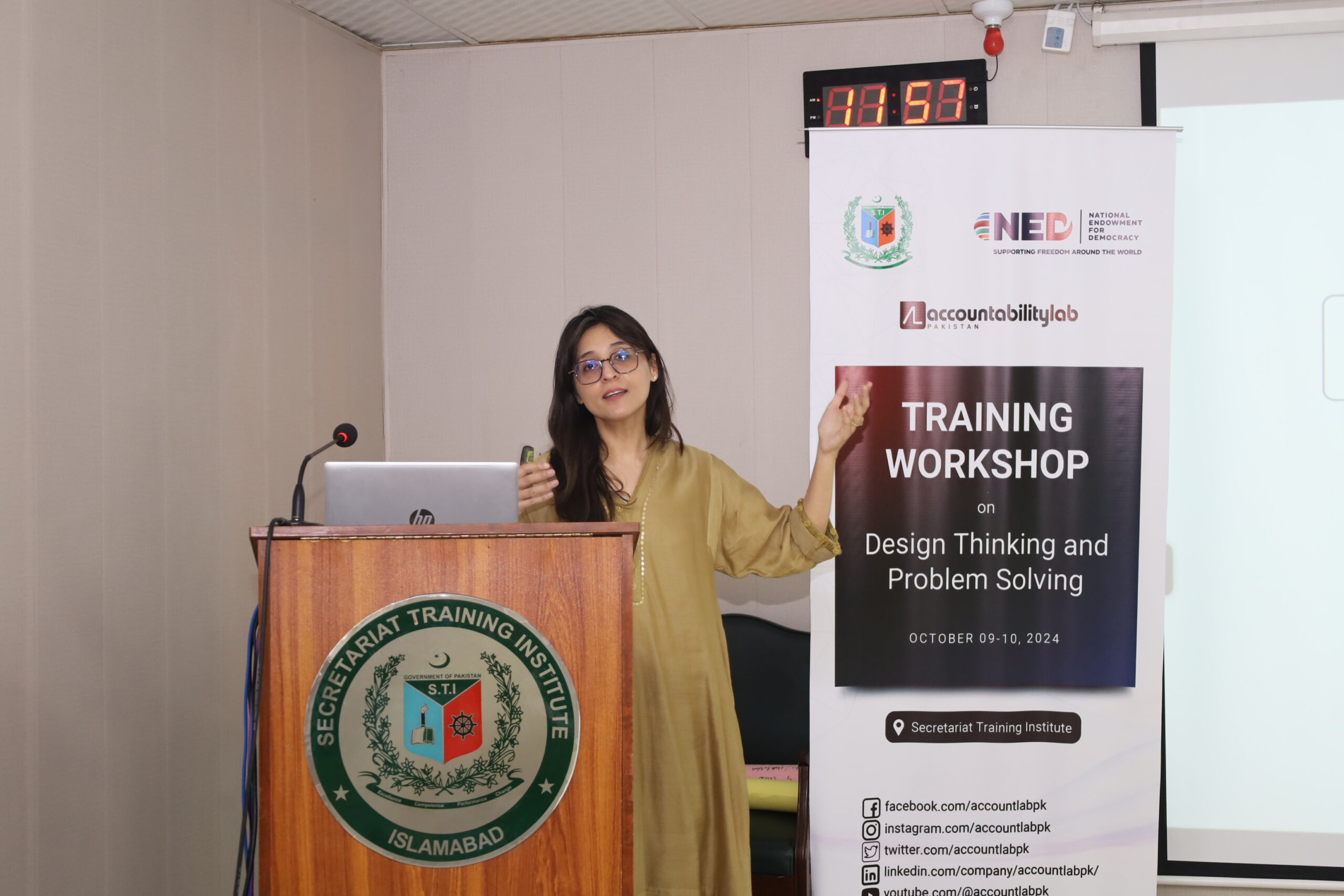NEWS

IN BRIEF

Written by: Muhammad Abubakar
Governance in Pakistan’s public sector has long faced challenges, including inefficiency, inadequate planning, and limited accountability. These systemic hurdles often manifest in stalled infrastructure initiatives and social programs that struggle to meet citizens' needs. However, there is a transformative opportunity to shift from traditional approaches to more inclusive and innovative methodologies — Human-Centered Design Thinking, emphasizing on empathy, collaboration, and iterative development to tackle real-world governance challenges more effectively.
SHARE
Governance in Pakistan’s public sector has long faced challenges, including inefficiency, inadequate planning, and limited accountability. These systemic hurdles often manifest in stalled infrastructure initiatives and social programs that struggle to meet citizens’ needs. However, there is a transformative opportunity to shift from traditional approaches to more inclusive and innovative methodologies — Human-Centered Design Thinking, emphasizing on empathy, collaboration, and iterative development to tackle real-world governance challenges more effectively.
While design thinking is not a new concept in the corporate world, its implementation in the public sector organizations is a relatively newer idea. With increasing populations and better connectivity, people’s needs for effective and efficient public service deliveries are changing radically. Not only the magnitude of these desired services has increased, the complexity of navigating bureaucratic systems makes it hard to mobilize the required assistance quickly. Confronted with such challenges, and equipped with technological advancements, public officials find design thinking approaches handy to collect citizens’ feedback and innovate their service delivery approaches to fit the given budgets and broader constitutional limits.
Below are key takeaways from a recent Human-Centric Design Thinking workshop arranged for the participants of the 41st Mid Career Management Course (MCMC) cohort at the Secretariat Training Institute (STI), organized by the Accountability Lab. This workshop underscored the importance of putting citizens at the heart of governance reforms and explored practical tools to improve public service delivery through empathy-driven engagement, co-creation, and continuous collection and incorporation of citizens’ feedback.
Bridging the Gap Between Policy and People:
Pakistan’s public sector has historically adopted a linear, top-down approach to policy-making and project implementation. Large-scale infrastructural projects or social welfare programs are often conceptualized and implemented with limited or no input from the targeted communities. As a result, many well-intentioned policies fall short of addressing citizens’ lived realities.
Consider urban transportation projects, where infrastructure may be developed, but poor coordination, inadequate facilities, and limited user input lead to underutilization of services offered. In public health, campaigns frequently struggle to achieve their goals due to cultural misunderstandings, logistical shortcomings, or a lack of community engagement. These failures stem from a fundamental issue: the absence of empathy and citizen engagement in service delivery design.
Empathy-Driven Solutions:
Design Thinking offers a structured process rooted in understanding and responding to citizens’ needs, making it a powerful tool for transforming public sector governance. By placing citizens at the heart of policy design, public officials can identify genuine pain points, develop solutions collaboratively, and test and refine initiatives through continuous citizen feedback.
“To truly innovate, we need to listen more than we speak. Governance that starts with empathy leads to solutions that actually work for people.”— Puruesh Chaudhry.
Addressing Systemic Challenges:
Applying Design Thinking in Pakistan’s public sector could help resolve some of the most persistent service delivery challenges:
- Sustainability: Engaging citizens throughout the design and implementation process ensures services are relevant and tailored to specific community needs, enhancing ownership of the community and sustainability of the initiatives.
- Project Effectiveness: Infrastructure projects often fail due to inadequate planning and a lack of stakeholder engagement. Design Thinking encourages proto-typing and testing reducing the risk of failure.
- Citizen Trust: Many governance initiatives fail because they lack public buy-in. By incorporating citizen feedback throughout the project lifecycle, the government can build ownership and trust of citizen and ensure that services meet their expectations.
An example of this approach is engaging daily commuters during the conceptualization of public transportation projects. By conducting interviews and prototyping small-scale enhancements—such as improved waiting areas or upgraded ticketing systems—the government can gather valuable feedback and scale up solutions effectively. This user-centered design process increases relevance and public satisfaction.
From Ideation to Impact:
“The future of governance lies in our ability to co-create solutions with the people.”
Design Thinking emphasizes collaborative ideation, prototyping, and rapid iteration. Unlike traditional governance models, which often impose solutions with a top-down approach- human centric design thinking encourages continuous testing and refinement. This adaptability helps public officials respond to changing needs while ensuring marginalized groups have a voice in shaping solutions that impact them.
Building a Citizen-Centric Future:
As Pakistan grapples with complex governance challenges ranging from urbanization to climate change, civil servants’ ability to engage citizens, adapt, and innovate can unlock public sector’s potential for transformative change by delivering impactful, sustainable governance solutions for all. By prioritizing empathy, iterative problem-solving, and collaboration with citizens, state institutions can enable public servants to co-create solutions that are both effective and aligned with the lived experiences of the communities they serve. Investing in citizens-focused, inclusive decision-making approaches will not only enhance public service delivery but also foster trust, build community ownership, and ensure that policies and programs are adaptable to the diverse and evolving needs of the population.
About the Author: Muhammad Abubakar is the Program and Communications Officer at the Accountability Lab Pakistan, and can be reached at mabubakar@accountabilitylab.org
